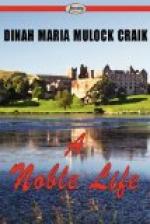“But that would have been murder—sheer murder,” earnestly replied the minister. “And we are not Spartans, but Christians, to whom the body is not every thing, and who believe that God can work out His wonderful will, if He chooses, through the meanest means—through the saddest tragedies and direst misfortunes. In one sense, Dr. Hamilton, there is no such thing as evil—that is, there is no actual evil in the world except sin.”
“There is plenty of that, alas!” said Mr. Menteith. “But as to the child, I wished you to see it—both of you together—if only to bear evidence as to its present condition. For the late earl, in his will, executed, by a most providential chance, the last time I was here, appointed me sole guardian and trustee to a possible widow or child. On me, therefore, depends the charge of this poor infant—the sole bar between those penniless, grasping, altogether discreditable Bruces, and the large property of Cairnforth. You see my position, gentlemen?”
It was not an easy one, and no wonder the honest man looked much troubled.
“I need not say that I never sought it—never thought it possible it would really fall to my lot; but it has fallen, and I must discharge it to the best of my ability. You see what the earl is—born alive, anyhow—though we can hardly wish him to survive.”
The three gentlemen were silent. At length Mr. Cardross said,
“There is one worse doubt which has occurred to me. Do you think, Dr. Hamilton, that the mind is as imperfect as the body? In short, is it not likely that the poor child may turn out to be an idiot?”
“I do not know; and it will be almost impossible to judge for months yet.”
“But, idiot or not,” cried Mr. Menteith—a regular old Tory, who clung with true conservative veneration to the noble race which he, his father, and grandfather had served faithfully for a century and more —–“idiot or not, the boy is undoubtedly Earl of Cairnforth.”
“Poor child!”
The gentlemen then sat down and thoroughly discussed the whole matter, finally deciding that, until things appeared somewhat plainer, it was advisable to keep the earl’s condition as much as possible from the world in general, and more especially from his own kindred. The Bruces, who lived abroad, would, it was naturally to be concluded—or Mr. Menteith, who had a lawyer’s slender faith in human nature, believed so —would pounce down, like eagles upon a wounded lamb, the instant they heard what a slender thread of life hung between them and these great possessions.
Under such circumstances, for the infant to be left unprotected in the solitudes of Loch Beg was very unadvisable; and, besides, it was the guardian’s duty to see that every aid which medical skill and surgical science could procure was supplied to a child so afflicted, and upon whose life so much depended. He therefore proposed and Dr. Hamilton agreed, that immediately after the funeral the little earl should be taken to Edinburg, and placed in the house of the latter, to remain there a year or two, or so long as might be necessary.




